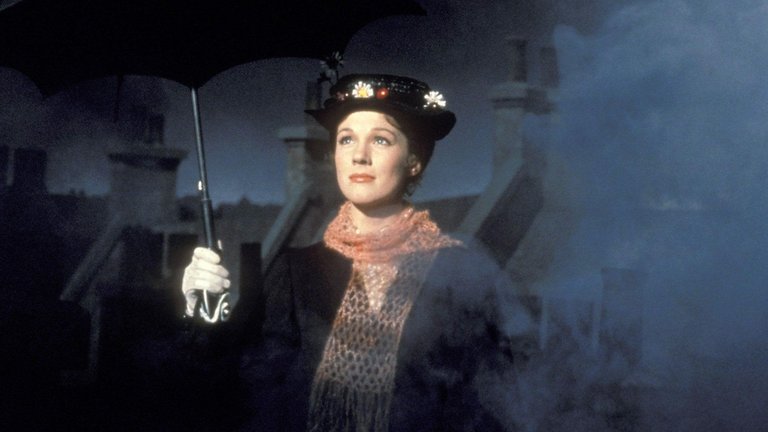
Disney, like all grand empires, was built gradually, evolving from a modest animation studio into the titan of Hollywood. This transformation became undisputable in 1964 with the release of Mary Poppins, a fantasy period comedy musical that solidified Disney's status as a cornerstone of American and global family entertainment. The film not only showcased Disney's innovative spirit but also marked a pivotal moment in cinematic history, blending live-action with animation in ways that captivated audiences and set new standards for the industry.
The film is based on the eponymous 1934 novel by English author P. L. Travers, which was the first in a beloved series. Travers' stories captured the imaginations of many, including Walt Disney's children, who inspired him to pursue the film rights in 1938. This quest proved to be a lengthy one, culminating in Disney's success in 1961. The subsequent feature film premiered in 1964, bringing Travers' enchanting world to life on the big screen.
Set in 1910 London, at the tail end of the Edwardian era, Mary Poppins begins in the home of George Banks (played by David Tomlinson), a bank manager preoccupied with his career, and his wife Winifred (played by Glynis Johns), who is involved in the burgeoning women’s suffrage movement. Their two children, Jane (played by Karen Dotrice) and Michael (played by Matthew Garber), are largely neglected amidst their parents' distractions. Previous nannies have failed to connect with the children, leading to frustration and frequent resignations. The latest nanny, Kate Nanna (played by Elsa Lanchester), quits, prompting the Banks family to place an advertisement for a new caregiver. Enter Mary Poppins (played by Julie Andrews), a whimsical and charming nanny who can fly and employs unconventional methods filled with fun and adventure. Alongside her friend Bert (played by Dick Van Dyke), a street artist and chimney sweep, she takes Jane and Michael on magical escapades that teach them valuable life lessons.
Mary Poppins is an exemplary representation of classic Hollywood cinema in the most favourable sense. Directed by Robert Stevenson, a prolific filmmaker for Disney, the film was shot entirely at Burbank studios, where elaborate sets convincingly recreate Edwardian London. The screenplay strikes a harmonious balance between humour, music, and moments of poignant depth—such as the touching scene featuring an elderly bird food vendor (played by Jane Darwell). The film offers an abundance of entertainment for younger viewers while evoking nostalgia for older audiences. Additionally, it contains layers of meaning for those inclined to analyse its themes; those who want to dig for deeper meaning might interpret it as an implicit feminist statement or commentary on the emerging 1960s cultural divide between Baby Boomers and preceding generations.
What truly distinguishes Mary Poppins is Walt Disney's mastery of cinematic magic. The special effects remain impressive even sixty years post-release, aside from a somewhat dated fireworks scene towards the end. However, it is Disney's exceptional ability to seamlessly blend top-notch animation with live action that shines brightest—particularly in the delightful sequence where Mary and Bert lead the children into a fantastical chalk drawing.
The music composed by the Sherman Brothers stands out as another significant asset of the film. Their score is arguably one of their most celebrated works, winning an Oscar for Best Original Song for "Chim Chim Cher-ee." The soundtrack features numerous catchy tunes that have endured through generations, contributing to the film's lasting legacy.
The cast of Mary Poppins is equally commendable. Julie Andrews makes her big screen debut as Mary Poppins after establishing herself on stage. Her portrayal is infused with charm and talent that render Mary one of the most iconic characters in 1960s cinema. Andrews' performance earned her an Academy Award for Best Actress, marking her ascent as one of Hollywood's most beloved stars.
Andrews is well-matched by Dick Van Dyke, a popular television entertainer who brings charisma to his role as Bert—the charming friend who serves almost as a Greek chorus throughout the story. Van Dyke also takes on the role of Mr Dawes Sr., Mr Banks' boss; his chemistry with Andrews is palpable despite his famously poor Cockney accent as Bert. The supporting cast also delivers strong performances; David Tomlinson's portrayal of George Banks evolves from that of a work-obsessed father to one who embraces joy and familial love.
Upon its release, Mary Poppins became a monumental box office success, emerging as one of Disney's greatest hits and generating substantial profits that facilitated the establishment of Disney World in Florida. However, not everyone embraced the film; P.L. Travers herself was notably displeased with Disney's creative choices—particularly regarding animation—and her experiences during production are chronicled in part by the 2013 biopic Saving Mr. Banks. Travers' dissatisfaction led her to prevent further adaptations of her work by Disney for decades; it wasn't until 2018 that fans finally received a sequel with Mary Poppins Returns, featuring Emily Blunt as the titular character.
Mary Poppins remains an enduring classic that encapsulates Disney's innovative spirit while delivering entertainment across generations. Its rich tapestry of characters, memorable music, and groundbreaking visual effects combine to create an unforgettable cinematic experience that continues to resonate today.
RATING: 8/10 (+++)
Blog in Croatian https://draxblog.com
Blog in English https://draxreview.wordpress.com/
InLeo blog https://inleo.io/@drax.leo
Hiveonboard: https://hiveonboard.com?ref=drax
InLeo: https://inleo.io/signup?referral=drax.leo
Rising Star game: https://www.risingstargame.com?referrer=drax
1Inch: https://1inch.exchange/#/r/0x83823d8CCB74F828148258BB4457642124b1328e
BTC donations: 1EWxiMiP6iiG9rger3NuUSd6HByaxQWafG
ETH donations: 0xB305F144323b99e6f8b1d66f5D7DE78B498C32A7
BCH donations: qpvxw0jax79lhmvlgcldkzpqanf03r9cjv8y6gtmk9
Posted Using InLeo Alpha